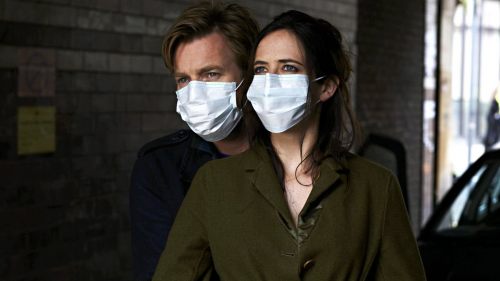THE SALVATION Review: A Western Homage That Is Very Much Its Own Thing
Don’t bother playing the “name that reference” game with Kristian Levring’s The Salvation; his film owes much to the titans of the Western archetype, but he makes few if any nods to them. For whatever reason, we tend to expect our genre films to pay visual or aural tribute to their sires as though homage is a toll to be paid rather than an optional, loving courtesy. With The Salvation, we might anticipate a riff on Unforgiven here, a whiff of The Searchers there, or a hat tip to The Man Who Shot Liberty Valance somewhere in between, and in fairness the film wears its Stetsons and duster coats with quiet reverence. But the keyword here is “quiet.” Whatever specific influences Levring draws upon, he refuses to fuss over them.
And that restraint is refreshing. The Salvation could have been a knock-off of any number of classics, and if you accept its tropes at face value, you can probably find traces of all of them. Yet Levring’s film is very much its own thing, a product of the Western’s glory days rather than a cheap attempt at imitating them. The details here are familiar; the story unfolds across the rolling arid plains of the American West, touring through dusty, broken-down frontier towns populated by cowards and dominated by a roving gang of murderers, eventually reaching a point where gunfights triumph over the letter of the law. But these aren’t the telltale signs of genre ode. They’re the basic conventions of the Western as a narrative mode.
Odds are, you’ll recognize the moving parts of Levring’s picture without much trouble if you’ve ever watched a single movie by John Ford, Sergio Leone, Clint Eastwood, or Enzo Castellari before, but this is Levring’s show, not theirs. If the man leans on allusion in the slightest, it’s only to infuse The Salvation with his own cultural stamp. The film’s hero is Jon (Mads Mikkelsen), a Danish settler of few words who like so many of his countrymen sojourned to America to make a new life for his family following the Second Schleswig War; we meet him as he greets his wife and child upon their arrival, though their happy union is short-lived. On the stagecoach ride to their new home, a pair of armed thugs forces Jon out of the carriage and take their pleasure from his loved ones. Jon, in turn, tracks the men and kills them with brutal efficiency, drawing the ire of Delarue (Jeffrey Dean Morgan), the region’s ruling outlaw and older brother to one of the deceased bandits. The circle of vengeance never ends.
The Salvation is probably better qualified as a revenge film first and a Western second, though that’s nothing more than a quibble of labels. (Frankly, “revenge” and “Western” go hand in hand. The vast landscape of the latter is the perfect place to mirror the insularity of the former.) This is a movie that’s all about the avenging act, with new wounds added to old ones at a steady clip throughout the plot. People hurt, so they hurt other people in exchange, and thus the cycle perpetuates itself. (Hey, even sadistic rapists have people in their lives who love them.) He cleverly sprinkles sly commentary about America’s love affair with oil atop the necessary “stuff” of Jon’s quest for retribution, giving the production layers it might otherwise lack, but Levring knows, and so do we, that the violence must eventually reach ahead. To that end, his film moves with purpose and is staged economically. Nothing here is wasted, and there’s nary a layer of fat to speak of – just cold, bloody justice, the good old fashioned kind.
The wild card here is Mikkelsen, who throughout his career has generally preferred to play charming psychopaths and anti-heroes than bona fide good guys. But the great Dane’s stoic bent and statuesque visage make a perfect fit for Jon, who would be an absolute loner but for his brother, Peter (Mikael Persbrandt, who nearly threatens to out-badass Mikkelsen). Mikkelsen’s firm, gracefully reserved work here is one of The Salvation’s elevating elements; the other is Eva Green, who co-stars as Delarue’s widowed sister-in-law, whose tongue was cut out by Indians years prior to the film’s events. She’s given little to do until around the final act, but when she finally takes action, she makes it count. Green and Mikkelsen are The Salvation’s two most important chess pieces. We know that they’re destined to collide eventually. We just don’t know how, and the waiting lends the whole affair a sustained suspense.
The Salvation doesn’t reinvent the wheel, and that’s fine: there’s no shame in embracing a genre’s staple characteristics, particularly when the results wind up looking this lovely. Levring has made a movie brimming with gorgeous aesthetic value and such agile, absorbing pacing that its ninety minute duration breezes by in what feels like half that amount. It’s great, sinewy stuff that’s nuanced and straightforward, nearly in equal measure.



